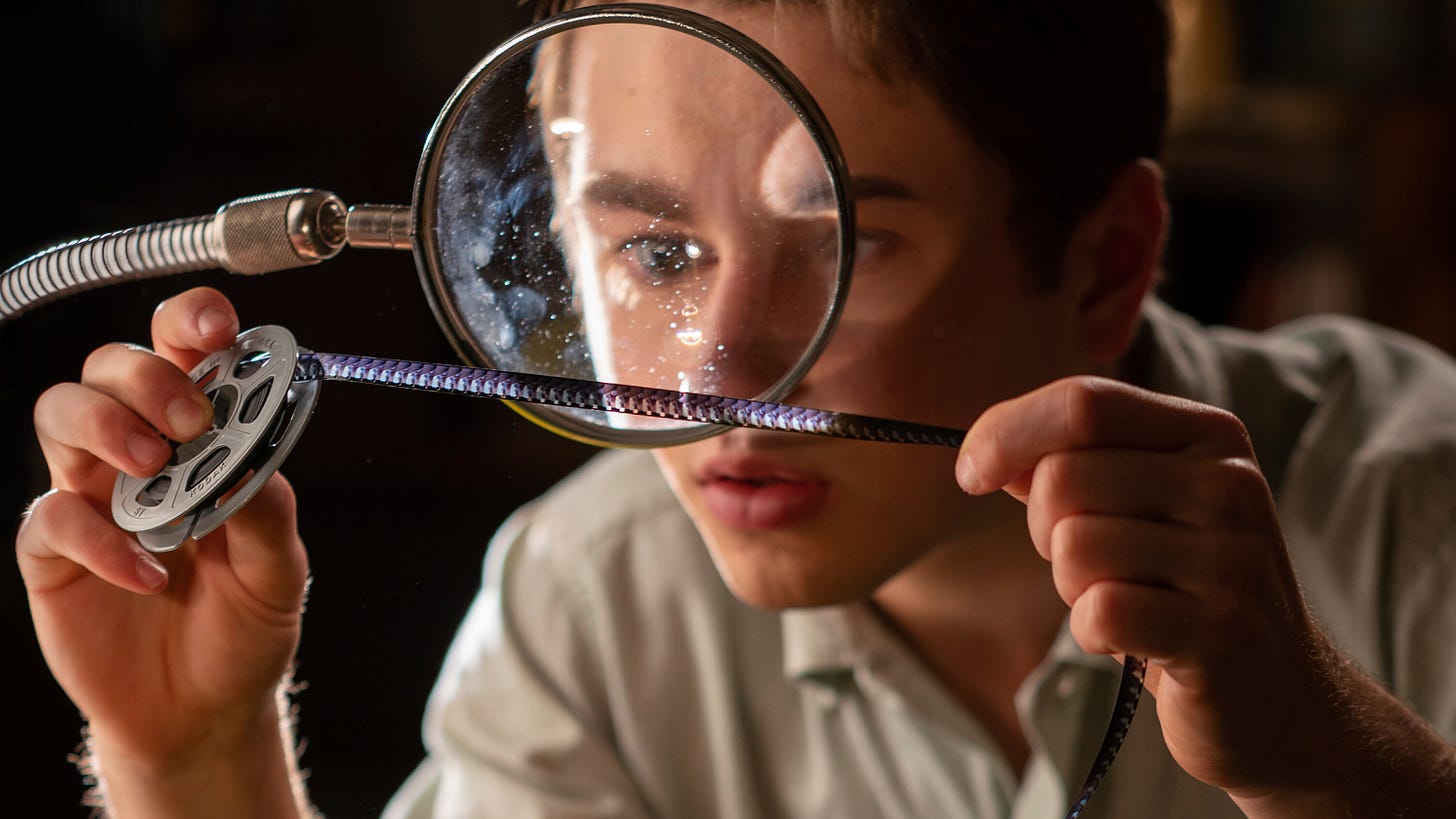In Review: 'The Fabelmans'
Steven Spielberg has been making autobiographical films his whole career. Now he tells his story directly.
The Fabelmans
Dir. Steven Spielberg
151 min.
The first thing you realize when watching The Fabelmans, Steven Spielberg’s semi-autobiographical coming-of-age film, is that he’s been making semi-autobiographical films for most of his half-century career, whether we’ve been conscious of it or not. Images that seem like references to E.T. the Extra Terrestrial or Close Encounters of the Third Kind are, in actuality, memories that had already been re-contextualized as Hollywood spectacle. Spielberg may have changed the industry forever by ushering in the blockbuster era, but for him, it was still an avenue for personal filmmaking, with stories that always circled back to fractured families, suburban cul-de-sacs, and fantasy as an outlet for lonely children. Commercial cinema was never incompatible with his life or his dreams.
That’s the reason why The Fabelmans opens with Spielberg’s avatar Sammy—played as a child by Mateo Zoryon Francis-DeFord and a 16-year-old by Gabriel LaBelle—getting taken to his first movie, Cecil B. DeMille’s 1952 drama The Greatest Show on Earth, which the fearful child is told will be like going to the circus. Through the magic of “Spielberg Face,” where the reaction shot comes before we see what is drawing the reaction, we notice that, if anything, Sammy is more startled by his first big-screen experience than he expected—and more transfixed, too. Though his father Burt (Paul Dano), a pioneering computer engineer, explained the science of cinematic illusion, the “persistence of vision” caused by 24 still frames flipping through a projector per second, the experience is like Harry Houdini witnessing his first magic trick.
Writing with Tony Kushner, who brought so much dimension to the familiar stories of Lincoln and West Side Story, Spielberg turns The Fabelmans into an act of self-mythology that nonetheless picks at old scabs. Events a young Spielberg surely didn’t understand as a kid are revisited with a combination of nostalgia and honesty, and the wisdom of a 75-year-old who realizes how much he embodies Wordsworth’s idiom that the child is the father of the man. As much as he can, however, Spielberg stays close to Sammy’s perspective as his growing obsession with movies—which his father encourages as a “hobby” but dismisses as a career pursuit—intersects with a home life that gradually, often imperceptibly loses stability.
The Fabelman parents, Burt and Mitzi (Michelle Williams), are a fascinating study in contrasts—one a square scientist and devoted family man, the other a seeker and an artist—and their children, Sammy and his two sisters, are the glue that can only hold them together for so long. A lot of influential characters slip in and out of Sammy’s life, but none are consequential as “Uncle Bennie” (Seth Rogen), who isn’t really his uncle, but has become a de facto member of the family. He’s touted as Burt’s best friend and work buddy, and makes the move with them from New Jersey to Arizona when Burt’s engineering genius starts to get recognized. But Sammy slowly realizes that Bennie means something special to his mother, too. His camera spots it before he does.
As Sammy ages, Spielberg follows his young self’s development as an 8mm and 16mm maestro, from at-home re-creations of the train wreck in The Greatest Show on Earth to a high school outing that resembles a cross between Beach Blanket Bingo and Leni Reifenstahl’s Olympia. He’s a prodigious student of the medium’s trickery, at one point stabbing pinspots in individual frames to mimic the flash of a gunshot, but his eagerness to mimic war pictures or John Ford oaters does not wall him off entirely from the real world. He plants truths in his illusions, illusions in his truth. His camera gives him insight into other people and they can see themselves in his movies, too.
The Fabelmans would be satisfying enough as just another of the many “love letters to the movies” that are popping up now that the medium’s future feels jeopardized, because few directors can put together images as dazzlingly as Steven Spielberg. And though the film is not without sentiment—a Spielberg hallmark, too—it isn’t a cozy nostalgia piece, either. Much like Armageddon Time from earlier this year, Spielberg is looking back on events that he couldn’t process fully until he was older and understood the complexities that govern adult relationships—complexities that they shield from their children by, say, referring to a guy like Bennie as an “uncle.”
Spielberg has chosen the right time to reveal his origins more directly in a film—in part because we can see the roots of the domestic turmoil in Close Encounters or E.T., and in part because he’s at a stage in his career where he doesn’t have to engineer our emotions so aggressively. We can simply see the three main adults in The Fabelmans for who they are—good, caring, flawed humans that deserve the understanding that a child isn’t yet equipped to give them. That isn’t to say that Spielberg believes any less in the fantastical allure of the movies now than he did when DeMille and Ford still commanded his imagination. But now in 70s, he keeps expanding his idea of what can fit into commercial movies, even as the possibilities of commercial movies seem to be shrinking.
The Fabelmans is currently played in limited release.






This sounds super promising. Spielberg's cinematic bona fides are unimpeachable, of course, but I've often believed many of his films would be better served if they ended 10 minutes earlier (before his desperation to please makes inevitable entrance). He has been toning it down lately, and perhaps in this one, he tones it down completely. Here's to hoping...
Imagine Seth Rogen's excitement turned into minor horror at being told "you'll be reading for the person that inspired me the most" by Spielberg without knowing the full history.